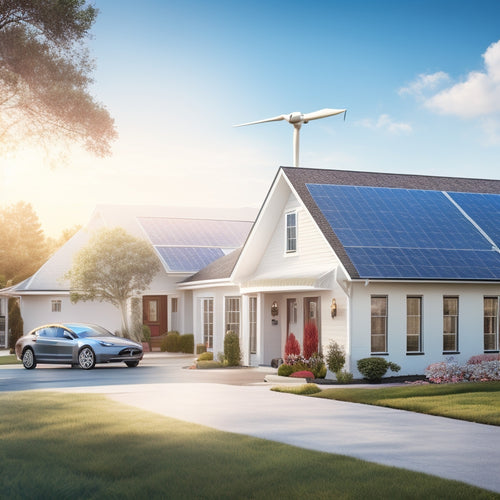
Is the Cost of Solar Panels in Texas Worth the Yearly Savings?
Share
By investing in solar panels in Texas, you can expect to save between $1,000 to $1,500 per year on your electricity bills, which can greatly offset the initial installation cost of $12,500 to $35,000. While the upfront investment may seem overwhelming, considering the average annual electricity savings and incentives like federal tax credits and state rebates, the overall cost-effectiveness becomes more appealing. Additionally, maintenance expenses are relatively low, and the long-term value of solar panels lies in their extended lifespan, increased property value, and energy independence. As you weigh the costs and benefits, there's more to uncover about what solar panels can do for you.
Key Takeaways
- Average Texas homeowners can save $1,000 to $1,500 per year on electricity bills with solar panels, offsetting the initial investment.
- With financing options and incentives, the upfront cost of solar panels in Texas can be significantly reduced, making it a more viable option.
- The long-term value of solar panels lies in their 25+ year lifespan, increased property value, and energy independence, providing a strong return on investment.
- Annual maintenance costs for solar panels are relatively low, ranging from hundreds to thousands of dollars, ensuring minimal upkeep expenses.
- The federal tax credit, state rebates, and net metering incentives can further reduce the cost of solar panels in Texas, making the yearly savings more substantial.
Texas Solar Panel Installation Costs
How much will it cost to install solar panels in Texas? The cost of solar panels in Texas varies depending on the size of the system, quality of equipment, and installation company.
On average, you can expect to pay between $2.50 and $3.50 per watt, with a typical residential system ranging from 5,000 to 10,000 watts. This puts the total cost at around $12,500 to $35,000.
The installation process typically involves a site assessment, system design, permitting, installation, and inspection.
You'll need to examine the cost of equipment, labor, and permits, as well as any additional features like energy storage or monitoring systems.
Fortunately, there are financing options available to help make solar more affordable. You can investigate options like cash purchases, loans, or power purchase agreements (PPAs) to find a financing solution that fits your budget.
With the right financing and installation company, you can start generating clean energy and reducing your reliance on the grid.
Average Annual Electricity Savings
With your solar panel system up and running, you'll start reaping the benefits of clean energy and reducing your electricity bills.
One of the most notable advantages of going solar is the average annual electricity savings you'll enjoy. According to the US Energy Information Administration, the average Texas household consumes around 1,200 kilowatt-hours (kWh) of electricity per month.
With a solar panel system, you can greatly decrease your energy consumption from the grid, leading to substantial savings on your electricity bills.
The amount you'll save depends on several factors, including the size of your solar panel system, your energy usage patterns, and the solar financing options you choose.
On average, a typical Texas homeowner can save around $1,000 to $1,500 per year on their electricity bills. This translates to a notable reduction in your energy costs, which can help offset the initial investment in your solar panel system.
Solar Panel Maintenance Expenses
Several hundred dollars annually is what you can expect to pay for solar panel maintenance expenses, a necessary investment to guarantee your system operates at its finest. This cost guarantees peak system performance, which is vital to maximize your yearly savings.
| Maintenance Task | Frequency | Cost |
|---|---|---|
| Panel cleaning | Quarterly | $100-$200 |
| Inverter replacement | Every 10-15 years | $1,000-$2,000 |
| System inspection | Annually | $100-$300 |
While these expenses may seem significant, they're fundamental to maintaining your system's efficiency. Neglecting maintenance can lead to reduced system performance, resulting in lower electricity savings. By investing in regular maintenance, you'll guarantee your system operates at its finest, providing you with the maximum return on your investment. Additionally, many solar panel manufacturers offer maintenance packages that can help offset these costs. By factoring in these expenses, you'll get a more accurate representation of the overall cost of solar panels in Texas and make an informed decision about whether they're worth the investment.
Incentives for Texas Homeowners
Now that you've factored in the cost of maintaining your solar panel system, it's time to investigate the incentives that can help offset the upfront investment. As a Texas homeowner, you're eligible for various incentives that can reduce the cost of going solar.
Here are some incentives you can take advantage of:
-
Federal Tax Credits: You can claim a federal tax credit of 26% of the total cost of your solar panel system. This credit can greatly reduce your tax liability, putting more money back in your pocket.
-
State Rebates: The state of Texas offers rebates for solar panel installations, which can range from $0.50 to $2.00 per watt. This can translate to a considerable discount on your overall cost.
-
Net Metering: With net metering, you can sell any excess energy generated by your solar panel system back to the grid and receive a credit on your utility bill.
- Property Tax Exemptions: Solar panels can increase your property value, but you won't have to pay higher property taxes on that increased value. Texas law exempts the value of solar panels from property taxation.
Long-Term Value of Solar Panels
Your solar panel system is a long-term investment, and its value extends far beyond the initial installation cost. With a typical solar panel lifespan of 25 years or more, you can expect a significant return on investment over time. Not only will you save money on your energy bills, but you'll also increase your property value and enjoy energy independence.
As you generate your own clean energy, you'll reduce your reliance on the grid and shield yourself from rising electricity rates. Plus, with net metering, you can even sell excess energy back to the utility company and offset your consumption during periods of low energy production. This means you'll have more control over your energy costs and a reduced carbon footprint.
In the long run, your solar panel system will pay for itself through the savings it generates. And, with minimal maintenance requirements, you can enjoy the benefits of solar energy with little to no hassle.
Frequently Asked Questions
Do Solar Panels Increase My Home's Value in Texas?
You'll be happy to know that installing solar panels in Texas can increase your home's value, thanks to solar incentives and exemptions from property taxes on the added value, making your property more attractive to potential buyers.
Can I Install Solar Panels on My Own in Texas?
You can attempt a DIY installation in Texas, but you'll need to maneuver through complex solar panel permits and local regulations, which may be time-consuming and costly, so it's recommended to hire a professional installer.
Are Solar Panels Resistant to Hail and Extreme Weather?
You'll be relieved to know that most solar panels are designed to withstand hail damage and extreme weather, boasting impressive weather durability thanks to rigorous testing and certification standards, ensuring your investment remains safe and efficient.
Can I Use Solar Panels With a Septic System in Texas?
You can install solar panels with a septic system in Texas, but you'll need to verify the panel's electrical connections and grounding meet local codes, and consider septic system maintenance access, as you evaluate solar panel compatibility with your septic system considerations.
Do Solar Panels Work During a Power Outage in Texas?
You'll need a battery backup system to guarantee your solar panels work during a power outage in Texas, as they typically don't provide power outage solutions on their own; however, pairing them with a battery can maintain solar panel efficiency and provide reliable energy.
Conclusion
You've crunched the numbers and weighed the pros and cons, and it's clear that investing in solar panels in Texas is a smart move. With significant yearly savings and incentives that sweeten the deal, the cost of solar panels is worth it in the long run. When you cut through the noise, it's a no-brainer: going solar in Texas is a sound investment that'll have you sitting pretty, reaping the benefits for years to come.
Related Posts
-

10 Essential Bike Lane Safety Features to Consider
You're designing a bike lane with safety in mind, and that's essential. The National Highway Traffic Safety Administr...
-

3 Best State and Local Solar Incentives USA
You can greatly reduce your energy dependence and save thousands of dollars by taking advantage of the top state and ...
-

Why Homeowners Are Embracing DIY Energy Independence
By taking control of your energy needs, you're breaking free from the uncertainty of utility bills and embracing a se...


